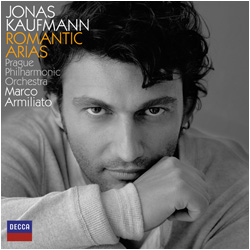|
|
|
|
|
|
|
|
| Bay Area Reporter, San Francisco |
| by Tim Pfaff |
|
|
Romantic Arias
|
|
|
 There are few faster ways to end a musical career prematurely than to be
opera's Next Thing. And, on evidence, if looks could kill, they'd conspire
in the demise, too. At a time when the bodies are piling up in the wings,
a likely survivor of the grisly process is Jonas Kaufmann, the 39-year-old
German tenor who recently weighed in with his first opera CD, Romantic
Arias (Decca). There are few faster ways to end a musical career prematurely than to be
opera's Next Thing. And, on evidence, if looks could kill, they'd conspire
in the demise, too. At a time when the bodies are piling up in the wings,
a likely survivor of the grisly process is Jonas Kaufmann, the 39-year-old
German tenor who recently weighed in with his first opera CD, Romantic
Arias (Decca).
Even more than his ringing voice and gripping stage presence, it's
Kaufmann's range as an artist that has secured him a place in the
present-day opera pantheon. Even when he was the new kid on the block, he
performed like one with uncommon instincts. It's turned out far more often
than not that if he thought a role was for him, it was, vocally and
dispositionally. Simply put, when he's onstage, you don't think about the
great singers from the past in the same roles.
Varied as they are, the 13 selections on the new disc only hint at his
range, leaving out the Monteverdi at one expressive extreme and the
Beethoven Florestan at the other. Surprisingly well-accompanied throughout
by the Prague Philharmonic Orchestra under Marco Armiliato, they show a
singer in his vocal prime with a secure technique who is, above all, a
creature of the stage. The great items aren't the ones on which he is
speculating, artistically; they're the ones he's scored his triumphs with
in the house.
The singing has impact. Don Jose's "Flower Song" from Bizet's Carmen
doesn't always reveal the whole character, but the full, tragic dimensions
of the soldier, doomed from the start by an obsessive love, are present in
Kaufmann's performance, alongside uncommon refinement. The sweep of his "E
lucevan le stelle," from Puccini's Tosca, brings the full weight of
Cavaradossi's struggle to an aria that can all too often become a static
showpiece.
The three Verdi selections, the Duke from Rigoletto, Alfredo from La
Traviata, and Carlo from Don Carlo, all show the deep involvement his
stage portrayals have given them. Still, it's Carlo's "Io la vidi" that
sounds as if it has been snatched from a live performance. The voice is
plangent, the phrasing masterful, but it's the urgency of this soul in
distress that grabs you by the throat.
The French selections are some of the best on the disc. Berlioz's ecstatic
Faust is given full voice, but Gounod's more lovesick one is no less
involving. Massenet may be a newcomer in his repertoire, but there's
already great sophistication in his Des Grieux, and the ache in his
"Pourquoi me reveillier," from Werther, brings the disc to a stirring
close.
The industry gurus let some things slip. The killer tessitura of "Ach, so
fromm" leaves the tenor hanging by his eyebrows, as it has so many others,
and the aria could have been dropped or replaced. And who let the audible
croak at the start of the middle stanza of Walther's Prize Song from Die
Meistersinger get by the audio editors? But this time the devil is not in
the details. The thrill, and there is a palpable one, is in hearing a
voice of this quality let rip.
There isn't another tenor working today I'd rather hear sing whatever he
chooses. His rise to the ranks of the truly great depends only on only one
thing, over which he has no control: whether the sound of his voice
lingers after the disc stops spinning or the curtain drops. |
|
|
|
|
|
| |
|
|
|
| |
|
|
|
|
|
| |
|
|
| |
|
|
|
|
| |
|
| |
|
|
| |
|
|
|
|
|
| |
|
|
|
|
|
|
|
|
|
|
|
|
|
| |
|
|
| |
|
|
|
|
|
|
|
|
|
|
|
|
|
|
|
|
|
|
| |
|
|
|
|
|
|
|
|
|
|
|